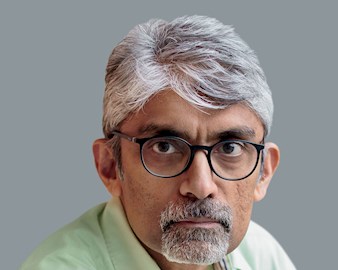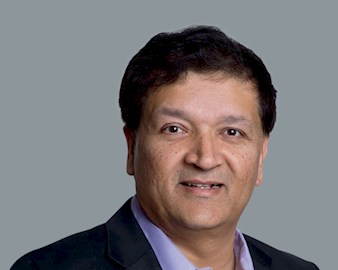
How can marketers build relationships with customers within an ever-evolving digital world? Two professors point the way forward.
- By
- May 01, 2018
- Marketing


Since 2016, professors Pradeep K. Chintagunta and Lil Mohan have been cohelming Digital Marketing for Executives, a three-day Executive Education course offered at Gleacher Center in downtown Chicago. Like other open-enrollment courses at Booth, it offers a chance for executives to take a step back from their day-to-day responsibilities in order to sharpen their skills and keep up with the evolving business landscape.
About three-fourths of those who sign up come from traditional verticals. It’s the remaining fourth, though, that help keep it eclectic. “I had a participant who worked for a large cosmetics company and another who was the CEO of a money-transfer business between here and Mexico,” Chintagunta recalled. For many, the course is their first Booth experience, and they find themselves learning alongside peers with diverse experiences—between two and three each session are over 60 years old, Chintagunta said.
Mohan, a renowned entrepreneur, teaches the framework and brings the applied perspective, while Chintagunta delves into the analytical topics.

Participants are asked to read a few thought-starter articles beforehand, including Think with Google’s “How Mobile Has Changed How People Get Things Done: New Consumer Behaviour Data” and Harvard Business Review’s “Competing on Customer Journeys.” They also complete a short questionnaire so that Chintagunta and Mohan know what role the participants play in their organization and what they hope to get out of the course.
In the first hour, the executives are assigned a team project to devise a holistic digital marketing strategy that they must complete and present to Chintagunta and Mohan on the final day. “I tell them not to pick a strategy for the whole, giant company,” Mohan said. “Instead, pick a division of the company and put yourself in the position where you can actually make a decision and make it happen within a 60-day window.”
Teams generally meet up after hours to design and fine-tune their strategies, as classroom time is devoted to several modules on what’s new and what’s next in the field. Mohan takes the lead on lessons, especially those relating to models and frameworks, content marketing, search marketing, mobile marketing, social-media, and omni-channel marketing.
Case studies on the likes of L’Oréal, Cisco, and Sephora are also introduced, with points of discussion such as, “What messages does Sephora need to convey to this target audience?”
Most important for Mohan to impart is that digital marketing is not about technology; it’s about people and relationships. “Digital marketing just happens to be a new medium by which you can build relationships,” he said. “I tell participants, ‘If you’re marketing on social media, you need to focus more on loyal customers, and here’s what you can do.’ That’s more important than a Twitter campaign or ad on Facebook.”
Chintagunta leads the discussions on data-driven marketing, his area of expertise. He teaches the executives how leveraging data can guide overall marketing strategy and explains the lessons to be learned from the effects of digital marketing. “With a lot of these digital-marketing strategies, when people look at the data, the hype in many instances has run ahead of what the data seems to suggest,” he said.
“You need to have an inquiring mind to be able to get the insight that will then, hopefully, lead to impact.”
The course concludes with each team presenting its digital marketing strategy to classmates and the professors. Presentations last about 10 minutes apiece, followed by a five-minute discussion. “Each team’s job is to convince the rest of the people in the room to fund this project of theirs,” Mohan said. “I don’t care if you use PowerPoint or if you do a drama or a dance. One person actually made a make-believe app. Some people get pretty creative.”
As it’s a nondegree course, grades aren’t given, but both Chintagunta and Mohan supply feedback about where the presentation succeeded and where it may have gone astray. “The main thing you want them to take away is some degree of comfort,” Chintagunta said. “Now maybe they have some framework that they can go back to their organization with that’ll help them think through the various issues.”
Mohan believes that upon completion of the course participants should have “a very clear picture of where they should put their money from now on.” For his part, Chintagunta hopes to impart that “you need to have an inquiring mind to be able to get the insight that will then, hopefully, lead to impact. That’s our positioning statement.”
Barbara Passy, ’07, Advisor to Kids in Danger, a children’s product safety nonprofit
The ascent of digital media throughout our lives has been stunning. Digital media now touches everyone who uses a mobile device and has shifted how we speak, act, and think. As Professor Mohan noted on our first day, “We are dealing with a new breed of consumers. They control the medium—not the marketers. Traditional marketing will not suffice.” That insight was key in showing how a shift of power can lead to the creation of new structures and form new relationships that require review and exploration. New concepts such as “the three c’s”—connection, conversion, and continuous engagement—will now guide my work in this field. My classmates provided fascinating perspectives. They came from a wide variety of geographies and industries, and we remain in contact.
Kathleen Leigh, Marketing Director for Digital Content and eCommerce at GOJO Industries Inc.
In the constantly evolving world of digital marketing, timely information and best practices from leading experts are critical to success. This course provides an excellent set of frameworks for developing markets, strategies, tactics, and measurements. The lessons I learned from instructors and other business leaders who participated in the course have already paid back the investment. I highly recommend it for any senior-level business leader who wants to lead their firm’s digital revolution or just take their digital marketing practices to the next level.

Executive MBA student Edoardo Collevecchio used Booth’s global flexibility to expand his company into Asia.
A Career Catalyst
Booth alumni weigh in on harnessing the power of creative thinking at the office.
Putting Creativity to Work
Alumni and students from Booth's Kilts Center for Marketing choose their favorite Big Game commercials.
Who Won the Big Game of Ads?